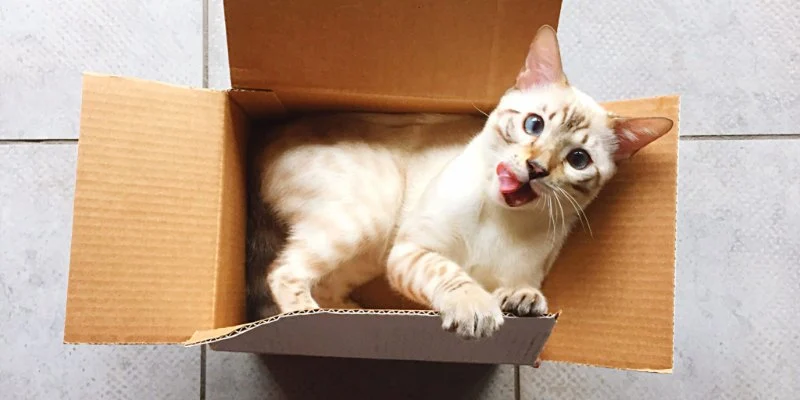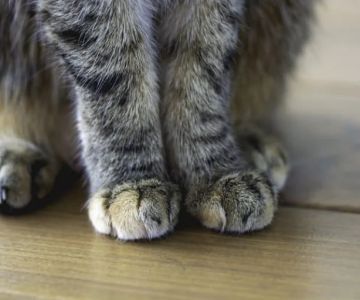
- 1-The Instinctive Behavior of Cats
- 2-Why Do Cats Love Boxes?
- 3-The Psychological Aspect of Boxes for Cats
- 4-Cats in the Wild and Small Spaces
- 5-How You Can Support Your Cat’s Need for Small Spaces
1. The Instinctive Behavior of Cats
One of the most fascinating aspects of cat behavior is their love for small, enclosed spaces, especially boxes. If you've ever watched a cat squeeze itself into a box or hide in a cupboard, you may have wondered why they seem to enjoy it so much. This behavior is deeply rooted in their instincts and natural behaviors, which have evolved over thousands of years.
Cats, both domestic and wild, are natural hunters, and their instincts encourage them to seek out safe, confined spaces where they can observe their surroundings while remaining hidden. This provides them with a sense of security and control, which is why boxes and small spaces are often irresistible to them.

Dermatology for Animals - Long Island
MassapequaNassau CountyNew York
4186 Sunrise Hwy, Massapequa, NY 11758, USA
2. Why Do Cats Love Boxes?
The love for boxes is one of the most commonly observed behaviors in cats, and there are several reasons why cats are drawn to them. Understanding these reasons can help you better understand your cat’s behavior and needs:

PetSmart Veterinary Services - San Juan Capistrano
San Juan CapistranoOrange CountyCalifornia
33963 Doheny Park Rd, San Juan Capistrano, CA 92675, USA
2.1 Safety and Security
For cats, boxes provide a sense of safety and security. In the wild, cats seek out tight, concealed spaces to protect themselves from predators. A box offers a similar feeling of security, as it allows a cat to hide, observe, and escape danger if needed. This is why many cats love to hide in boxes when they are feeling stressed, anxious, or overwhelmed by their environment.
2.2 Hunting and Play Behavior
As natural predators, cats are constantly looking for opportunities to stalk, pounce, and explore. A box provides a perfect "hunting ground" for a cat to engage in these behaviors. The confined space allows them to hide, peek out, and then pounce on toys or imaginary prey. This mimics their wild hunting instincts and offers both mental and physical stimulation.
2.3 Comfort and Warmth
Boxes are often small and cozy, which appeals to a cat’s need for warmth and comfort. Cats seek out warm spaces to rest and sleep, and boxes, especially those placed in a sunbeam or near a heater, offer a perfect, snug spot. The enclosed nature of the box helps trap the cat’s body heat, providing a warm and comfortable environment for rest.
3. The Psychological Aspect of Boxes for Cats
Beyond the physical benefits, the psychological impact of boxes and small spaces plays a key role in why cats are drawn to them. The box becomes a safe haven, a personal space where cats can retreat when they need to relax or escape from stimuli. Here’s a deeper look at the psychological aspects of this behavior:
3.1 Territory and Control
Cats are territorial animals, and boxes allow them to claim and control a space within their environment. By choosing a box, a cat is marking it as their own, reinforcing their sense of ownership and control over their surroundings. This territorial behavior helps cats feel more secure in their home and less threatened by changes in their environment.
3.2 Stress Relief and Coping Mechanism
In times of stress or uncertainty, cats will often retreat to small, hidden spaces as a coping mechanism. Whether it's due to loud noises, new people, or other stressors in the environment, the box serves as a comforting escape. Being able to retreat to a box or similar space helps cats feel safe and in control, reducing anxiety and stress levels.
4. Cats in the Wild and Small Spaces
The behavior of domestic cats in relation to boxes can be traced back to their wild ancestors. In the wild, small spaces are vital for survival. Cats are solitary hunters, and their need for shelter, concealment, and safety is key to their hunting success. Here are some ways this behavior is connected to their wild instincts:
4.1 Hiding from Predators
In the wild, cats must remain vigilant for predators that may pose a threat. Small, enclosed spaces provide them with a place to hide and escape danger. This instinct to seek out tight spaces is still present in domestic cats, even though they may not face the same threats in their homes. The desire to retreat into a box when feeling threatened is a direct reflection of their wild instincts.
4.2 Resting in a Secure Spot
Wild cats also use small spaces as resting spots, often within dense foliage or caves, where they are protected from larger predators. Domestic cats retain this instinct, and boxes give them a secure area to rest undisturbed. The desire for a safe place to sleep is deeply ingrained in their behavior.
5. How You Can Support Your Cat’s Need for Small Spaces
Understanding your cat’s love for boxes and small spaces can help you create a more enriching and comfortable environment for them. Here are some ways to support this instinctive behavior:
5.1 Provide Different Types of Hideaways
While boxes are a popular choice, there are other types of hideaways that you can offer your cat. Consider providing small cat tents, tunnels, or covered cat beds. These alternatives offer similar benefits, providing a sense of security and a private space for your cat to retreat to when they need it.
5.2 Keep Boxes Accessible
If your cat enjoys spending time in boxes, make sure they have easy access to them. Leave boxes in quiet areas of your home where your cat can hide and observe their surroundings in peace. Avoid placing the boxes in high-traffic areas that may disturb your cat’s sense of security.
5.3 Respect Their Space
Finally, always respect your cat’s need for personal space. If your cat chooses to hide in a box or small area, allow them to do so without disturbance. Forcing your cat to leave their safe space can cause stress and anxiety, so be sure to provide them with the opportunity to rest or relax in their chosen hideaway.
To learn more about how to enrich your cat’s life and provide them with everything they need for comfort and security, visit Omnia Pet for the best products and expert recommendations tailored to your cat’s natural instincts and behaviors.







 Petco4.0 (1201 reviews)
Petco4.0 (1201 reviews) Mendoza's Feed and Supply5.0 (21 reviews)
Mendoza's Feed and Supply5.0 (21 reviews) Petco4.0 (1009 reviews)
Petco4.0 (1009 reviews) Nature Aquarium4.0 (241 reviews)
Nature Aquarium4.0 (241 reviews) New England Reptile Distributors - NERD4.0 (19 reviews)
New England Reptile Distributors - NERD4.0 (19 reviews) Veterinary Specialty Group of Glendora4.0 (48 reviews)
Veterinary Specialty Group of Glendora4.0 (48 reviews) The Most Unusual Pets That Are Legal to Own in the US | Unique Pet Ideas
The Most Unusual Pets That Are Legal to Own in the US | Unique Pet Ideas Signs of Bloat in Dogs (GDV): This is a Life-Threatening Emergency
Signs of Bloat in Dogs (GDV): This is a Life-Threatening Emergency How to Tell if Your Kitten is Bonding with You – Signs to Watch For
How to Tell if Your Kitten is Bonding with You – Signs to Watch For The Best Diet for a Sphynx Kitten's Oily Skin
The Best Diet for a Sphynx Kitten's Oily Skin Understanding Kitten Neutering and Spaying: Best Age and Benefits
Understanding Kitten Neutering and Spaying: Best Age and Benefits The Truth About Essential Oils and Pets: Which Ones Are Dangerous?
The Truth About Essential Oils and Pets: Which Ones Are Dangerous?